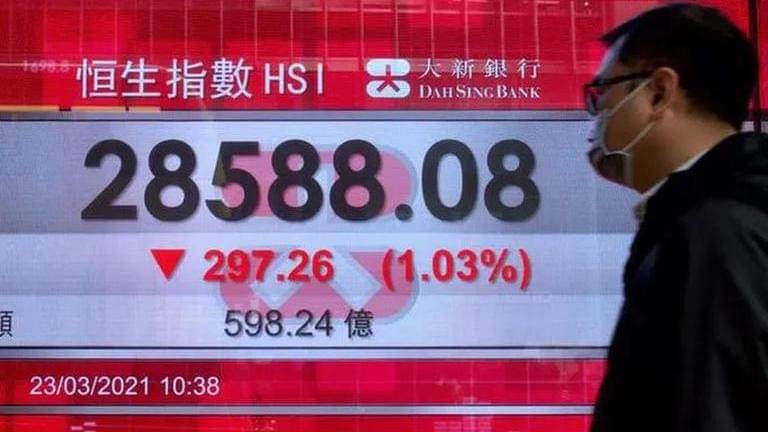Play all audios:
Image: AP/Representative | Image: self Stocks were mixed in Asia and oil prices fell Monday as uncertainty over the war in Ukraine and persistently high inflation kept investors guessing
about what lies ahead. Tokyo and Sydney advanced while Hong Kong, Seoul and Shanghai declined. US futures were higher. "With the Federal Reserve due to hold a policy meeting this
week, Markets are bracing for two diametrically opposed forces, which will obfuscate the picture," Mizuho Bank said in a commentary. "One is geo-political uncertainty that may
leash fresh convulsions of risk off' and the other, a hawkish Fed that is poised to hike" interest rates by at least 0.25 percentage points," it explained. ZELENSKYY VOWS TO
CONTINUE NEGOTIATIONS WITH RUSSIA Ukrainian President Volodymyr Zelenskyy vowed to keep negotiating with Russia as Russian forces bombarded a military training base near the Polish border,
killing nine and wounding dozens of people. Talks aimed at reaching a cease-fire failed again on Saturday, Russia's widening of its offensive to the western part of Ukraine comes amid
warnings over the widening impact from the conflict. Moody's Investor Service said it was reviewing its credit ratings for both countries in view of rising security, economic and
financial risks. Spreading outbreaks of coronavirus in China have added to uncertainties, with authorities ordering a lockdown in the technology and manufacturing hub of Shenzhen, near Hong
Kong, that could worsen supply chain disruptions. Hong Kong's Hang Seng index lost 3.8% to 19,763.69 and the Shanghai Composite index slipped 1.9% to 3,247.48. Chinese shares have
also come under selling pressure due to the threat of de-listings of major Chinese companies on US stock exchanges. US STOCKS ABOUT 10% BELOW THEIR PEAK FROM THIS YEAR A report in the
state-run newspaper _Economic Daily_ said Monday that regulators are negotiating to resolve a dispute over auditing rules. The Securities and Exchange Commission has moved to require that
US-listed foreign stocks disclose their ownership structures and audit reports. That has come on top of technology-related sanctions against some companies. Wang Sheng, head of the
investment banking division at China International Capital Corp, said in an opinion piece that China and the US should be able to strike a deal. Tokyo's Nikkei 225 index rose 0.6% to
25,307.85 and the S&P/ASX 200 in Australia gained 1.2% to 7,149.40. South Korea's Kospi lost 0.6% to 2,644.99. On Friday, the S&P 500 fell 1.3% to 4,204.31. The Dow Jones
Industrial Average lost 0.7% to 32,944.19, while the Nasdaq composite index gave up 2.2% to 12,843.81. The Russell 2000 index of smaller companies slipped 1.6% to 1,979.67. World markets
have been rocked by dramatic reversals as investors struggle to guess how Russia's invasion of Ukraine will affect prices of oil, wheat and other commodities produced in the region.
That's raising the risk the US economy may struggle under a toxic combination of persistently high inflation and stagnating growth. The Federal Reserve is expected to raise interest
rates at its meeting this week as it and other central banks act to stamp out the highest inflation in generations while trying to avoid causing a recession by raising rates too high or too
quickly. Amid all the uncertainty, US stocks remain about 10% below their peak from earlier this year, while crude oil prices remain more than 40% higher for 2022 so far. US benchmark crude
oil lost USD 2.73 to USD 106.62 per barrel in electronic trading on the New York Mercantile Exchange. It surged USD 3.31 per barrel on Friday to USD 109.33 per barrel. Brent crude oil, the
standard for international pricing, declined USD 2.48 to USD 110.19 per barrel. The US dollar rose to 117.78 Japanese yen from 117.35 yen. The euro weakened to USD 1.0915 from USD 1.0926.

